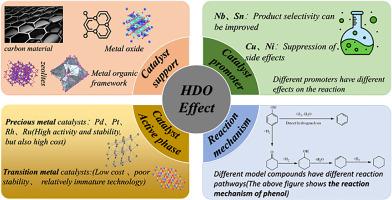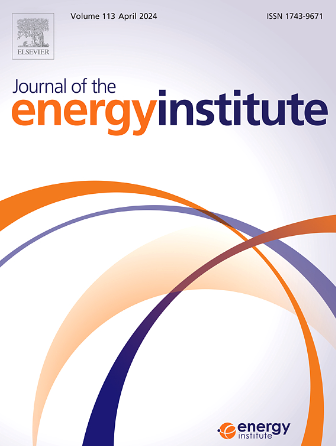可再生生物油加氢脱氧催化剂制备第二代生物柴油的研究进展
IF 6.2
2区 工程技术
Q2 ENERGY & FUELS
引用次数: 0
摘要
近年来,日益严重的能源危机和温室效应促使人们广泛采用生物燃料作为化石燃料的有希望的替代品。然而,通过酯交换法生产的第一代生物柴油存在固有的局限性,包括氧含量高、稳定性差、热值低。在这种情况下,通过加氢脱氧过程生产的第二代生物柴油具有明显的优势,可以随时为现有的燃料基础设施做好准备。近年来研究的重点是氢脱氧(HDO)催化剂。本文系统地综述了用于生物油升级的HDO催化剂的最新进展,重点介绍了催化剂的三个关键方面:活性相、载体和促进剂。我们批判性地评估了传统的硫化物催化剂和新兴的无硫替代品,强调了它们的脱氧效率和稳定性挑战。此外,展望了催化剂设计策略的发展前景,如MOFs作为载体和催化剂设计中的缺陷工程,以指导开发具有成本效益和可持续性的HDO系统。本文章由计算机程序翻译,如有差异,请以英文原文为准。

Recent advances in hydrodeoxygenation catalysts for upgrading the renewable bio-oils to second-generation biodiesel
In recent years, the rising energy crisis and greenhouse effects have driven wide spread adoption of biofuels as promising alternatives to fossil fuels. However, first-generation biodiesel produced by transesterification exhibit inherent limitations, including high oxygen content, poor stability, and low calorific value. In this context, second-generation biodiesel produced through hydrodeoxygenation processes demonstrate a distinct advantage of being drop-in ready for existing fuel infrastructure. The recent research focuses on hydrodeoxygenation (HDO) catalysts. This review systematically examines recent advances in HDO catalysts for bio-oil upgrading, focusing on three key aspects of the catalysts: the active phase, the support, and the promoter. We critically evaluate traditional sulfide catalysts and emerging sulfur-free alternatives, highlighting their deoxygenation efficiency, and stability challenges. In addition, prospects on catalyst design strategies, such as MOFs as supports and defect engineering in catalyst design, are discussed to guide the development of cost-effective and sustainable HDO systems.
求助全文
通过发布文献求助,成功后即可免费获取论文全文。
去求助
来源期刊

Journal of The Energy Institute
工程技术-能源与燃料
CiteScore
10.60
自引率
5.30%
发文量
166
审稿时长
16 days
期刊介绍:
The Journal of the Energy Institute provides peer reviewed coverage of original high quality research on energy, engineering and technology.The coverage is broad and the main areas of interest include:
Combustion engineering and associated technologies; process heating; power generation; engines and propulsion; emissions and environmental pollution control; clean coal technologies; carbon abatement technologies
Emissions and environmental pollution control; safety and hazards;
Clean coal technologies; carbon abatement technologies, including carbon capture and storage, CCS;
Petroleum engineering and fuel quality, including storage and transport
Alternative energy sources; biomass utilisation and biomass conversion technologies; energy from waste, incineration and recycling
Energy conversion, energy recovery and energy efficiency; space heating, fuel cells, heat pumps and cooling systems
Energy storage
The journal''s coverage reflects changes in energy technology that result from the transition to more efficient energy production and end use together with reduced carbon emission.
 求助内容:
求助内容: 应助结果提醒方式:
应助结果提醒方式:


